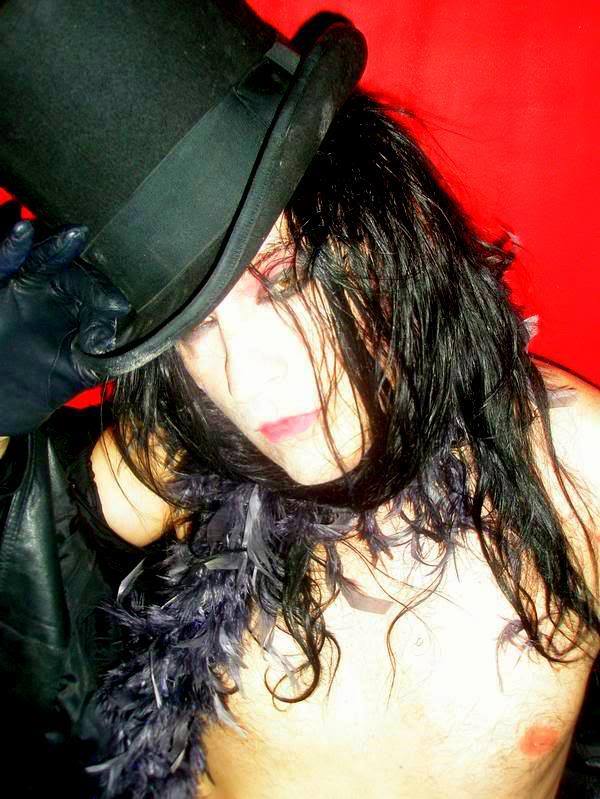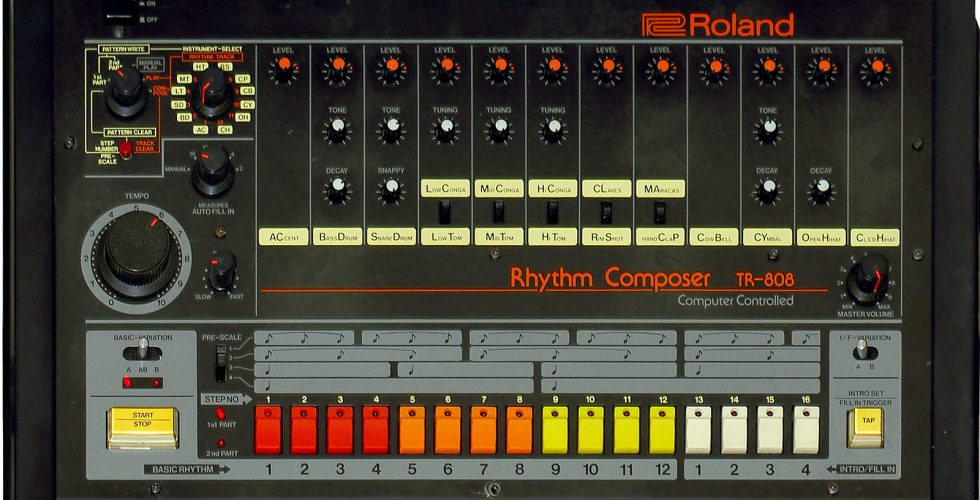A Toronto-based, Canadian born but internationally bred Hyde of the glitter rock group, Sister Hyde, took some time to talk to Gigmor this week to tell us a little bit more his history in the music industry, the past and present trajectory of his artistry, and the stories, tips, and tricks he picked up along the way.
Hyde grew up as a diplomat’s son — more specifically, as the son of a Canadian diplomat to Mexico, Guatemala and Venezuela/ . In an arena of privilege and social importance, Hyde broke through with his ‘devil may care’ attitude to try and become his own sort of diplomat, one exclusively interested in sex, drugs and rock n’ roll. From a childhood that had him bouncing from Canada to Mexico to other bits of the United States, Hyde had the magic potion: the mind and freedom to figure out just what it was that could and would turn him on. He built himself around and then into the thrills to be found in acts like Bowie, the New York Dolls, Alice Cooper, and T. Rex. Gigmor sat down with Hyde of Sister Hyde to hear a little more about his history in the music industry, his influences today, and how it has all changed, or hasn’t, over time.
Tell me a little bit more about your background. Where did you grow up, and where did you collect these influences?
“I grew up in a backwater capital of Canada called Ottawa. My dad was a diplomat so I born in England but we moved to Ottawa right away. And Ottawa is just a place that is filled with civil servants and hockey players. And it was there that I got my roots, had all my first experiences and exposures. When I was 16 actually I played hooky from high school so I could go and see Alice Cooper for the first time. Hitchhiking along the road, I ended up getting picked up by the roadies for the band. With an iceberg of Peruvian cocaine in front of my face and a trunk filled with gimmicks, props and rock theatrics in the back, this was my first exposure to a lot of things.”
Amazing. Found yourself in the middle of history there, eh? Were there any other scenes that you dug into?
“I found myself in England in 1976 at the very start of punk. I had a huge perm, like I got mistaken for Peter Frampton once. He was big back then, ya know. I saw that movement at it’s very beginning which, you know, is the best time to see a movement come to life. So when I headed back to Canada I was able to carry that with me and integrated into the band that I was in. We then became Ottawa’s first punk band. Now, presently, here, back in Toronto, Sister Hyde is doing well. But it’s difficult, sometimes it’s a matter of getting one fan at a time. It’s really a people business, there is no denying that.”
How is Canada treating you and your glam punk band?
“I’m going to stay in Toronto for a little while longer, Sister Hyde is having a lot of fun here — but it’s tough, you know, because a lot of places are closing down. Live music and rock music isn’t as profitable as having a club or dance music. There is one place in Ottawa, for example, that has just closed down. Toronto doesn’t really have a scene flowing; I think that scenes can only ever really happen where there is low rent and where the artists can find it affordable to live there.”
So when your environment is failing you, you have to find something else to work with. Is that why you use something like Gigmor?
“Gigmor, yes, that helps because it has never really mattered where you lived now in the digital age. It’s more about being online and creating your opportunities there. But I do find GIgmor really informative too, especially with their newsletter and blog stuff. Because I’m doing all of the band outreach myself, I find all of that super helpful.”
What are you and the band working on now?
“Right now I am working on an all analog album. It’s just pure, not a computer or another something digital in site. In my opinion, when you go too digital, you take all of the guts and goods out of a song. It can start to really sound like the best rock n’ roll you’ve ever heard.”
There is a darker edge that my new music will have is going to surprise some of the critics I think, and this album being all analog will reflect that, but I don’t mind. In my mind I find that has the world gets darker, so does my music. And these are some dark times. Maybe it could be even passing for something different — but it’s all still glam rock. This time, it just has more of a punk edge.”
Correct me if I’m wrong, but it sounds like you can from some sort of strict, posh background. Something a little bit more proper, am I wrong?
“No, that’s not wrong. I mean like I said my dad was an ambassador to Mexico, Guatemala and Venezuela. And, funny story here, I actually went down to Mexico for school and got into a couple of scenes down there. I joined some Mexican bands, immediately got into the rock n’ roll, sex n’ drugs sort of scene. It wasn’t until my dad’s co-workers (the police) got ahold of me that I had to leave the country. My dad never wanted to see me again after that. It ended with me in a limo to the Mexican airport with two cops on either side. And all I could think was how fucking rock n’ roll this all was.
So then you moved to Los Angeles to continue pursuing your musical and artistic career, right? How did that go? What was it like to be surrounding by a lot of other someones pursuing a similar dream?
“I think of performing as an art, and that’s the difference between a lot of people and me. What I find to be the most lacking in musicians and artists today is a little thing called attitude. And you can’t really buy that thing. Some people try and buy it, but you can’t.”
No I think you’re right, it’s not something you can acquire — it’s organic. You either have it or you don’t. And everything that you’re saying, I can see how Bowie became such a huge influence for you. Everything that Bowie did and said put artistry hand-in-hand with his music.
“Oh yeah, Bowie is a huge influence. I met him and Jagger at the same time. And, you know, I remember, Bowie did this thing where whenever or whomever he was talking to he would never take his eyes off of you. He never broke eye contact. You were the most interesting person in the room. This was when I was living in L.A., and I met Madonna around those parts at that time, too.”
Amazing, absolutely amazing that you met Bowie. And Jagger. Madonna, too. You really were in the right place at the right time.
Yeah but you know you never really get anywhere without being a little bit of prick. You know, all of these people had a truly inflated sense of ego. And here is how I can think about that. And I think I always knew I had a final destination of being a rock star, I’ve always sort of thought that that was what I always wanted to work towards. But lately, especially, I’m realizing that that isn’t what is going to make me happy.”
Are you referring to the false god of fame?
“Sort of, yes. A lot of people don’t realize that fame isn’t going to be the ticket to happiness. They are always trying to say you know ‘I’m going to be finally happy when I make it. And so I asked the question then, ‘Well, what if you don’t.’
Oh really? You were asking that question.
Yes, I’ve definitely started too. But when I was living in Los Angeles I used to ask the same question to everyone, ‘what advice do you give to a young person starting out in show business?’ And over time I got quite a few really good responses. One of my favorites was, ‘Do it. But make sure you’re having fun while you’re doing it in case you don’t make it. At least you had fun.”
That’s great! And you could look at anything with that sort of perspective. If you give up and give in to whatever may or may not happen, but you’re still working towards that final goal AND finding happiness or having fun, then you won’t regret a thing. It won’t matter what happens in the end.
Yes, and that’s the reality that we’re finding more and more. Who is to say who is really happy? Was Prince really happy? It’s easy to imagine but that’s not always the truth.
You’re right, you’re so right. Only they could know. You have to still find happiness in it.
Yeah, yeah exactly.
Tell me more about the theatrics you use in your performances. Glitter punk calls for a lot, and I want to know what kind of tools you’re using to turn people on while on-stage.
Well you’ve got to do a lot — you’re really trying to keep people’s attention for a pretty long amount of time — but I have never found it too difficult. I try to do anything that I think will scare the someones in the audience. Anything that is counter-intuitive, counter-culture. If you look down and get on your phone I will call you out, I’ll come trailing after you for that and put my guitar between your legs. Literally.
And do you ever find that when people are more conservative, or when people are almost tangibly putting up walls to something, that you’re even more motivated to turn it around and mess with them? I’ve only ever felt that in a sort of personal context, but I think that it reigns true for a lot of people.
Oh yeah, I find that to be really true with me. I do a lot for an eyebrow raise. I’ve performed on-stage in sequined black mini-skirts with fishnets and then a top hat and a navy pirate jacket on top. So the top is kind of male still, even though I have makeup on, but the bottom is kind of female. So anyone walking into to that is going to think ‘what the fuck?!” It’s all about that Bowie button, that kind of thing. I understand what you’re saying. I have to restrain that instinct sometimes, but I find that that is never what I want to be doing. I’d always prefer to be controversial, something sour. I always say, be your own sex symbol. You’ve got to turn yourself on before turning anybody else on, ya know?



